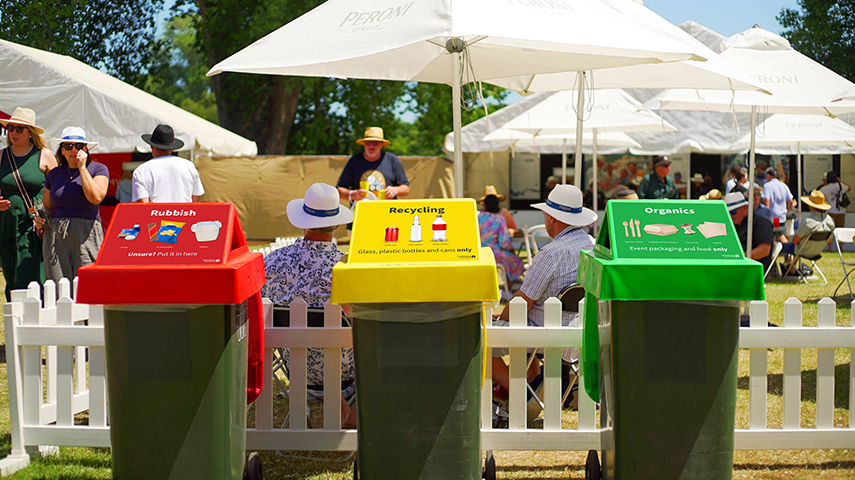We're targeting the reduction and diversion of waste by leading the Sustainable Events Canterbury initiative.

Register your event for the Sustainable Events Canterbury project

The Sustainable Events Canterbury initiative brings together the efforts of Christchurch City Council’s Composting Food Packaging at Events (CFPE) initiative and Selwyn District Council’s Selwyn Events Sustainably Initiative.
This consolidation aims to simplify things for event organisers and exhibitors within the wider Christchurch region so that regardless of whether the event is in Lincoln or Linwood, the packaging requirements will be the same, minimising waste and maximising landfill diversion through the use of approved compostable packaging and effective waste-sorting practices.
Participating events operate a closed-loop system where all food is served in approved compostable packaging. Both food scraps and packaging go into designated green bins for local composting.
It's important to note that while numerous products claim to be compostable, there are no New Zealand standards to prevent false claims, so this initiative only endorses packaging that has been vetted by the Council and local compost facilities to guarantee compatibility with our composting processes and standards.
Each event provides three waste streams for public use, similar to home kerbside bins but with event-specific distinctions:
- Green for organics, including food and approved compostable packaging (unlike regular green bins that exclude packaging).
- Yellow for clean cardboard, plastic bottles, drink cans, and glass bottles (mirroring standard recycling practices).
- Rer for landfill waste including all lids.
Some events, depending on budget, deploy bin ambassadors at stations to educate attendees on proper waste disposal practices.
All waste generated at events undergoes rigorous hand-sorting by trained staff or volunteers. This meticulous process is essential to eliminate contamination in compost and recycling streams, thereby optimizing landfill diversion. Despite providing dedicated bins, events often experience high contamination rates, necessitating this sorting process for materials to be accepted at local processing facilities.
Through these measures, Sustainable Events Canterbury not only enhances environmental stewardship at events but also sets a precedent for sustainable event management practices across Christchurch.
If you want to divert waste from your event to recycling and compost, you can talk to our events development team via eventsdevelopment@ccc.govt.nz or talk to your waste management provider.
Participating in this project offers a fantastic opportunity for event organisers to make a positive impact on the environment.
As event organisers, we have a shared responsibility to minimise our events' environmental footprint. By embracing sustainable practices, you'll enhance the culture of your event, demonstrating leadership in sustainable event management and encouraging attendees to join the movement.
With the Waste Management and Minimisation Bylaw now in effect, it’s essential for events to address waste management proactively.
Engaging in sustainable practices can also boost your chances of securing funding and sponsorship, and help build your reputation within the industry. Plus, by participating, you'll be supporting local businesses and contributing to the city’s sustainability goals.
For more details on how to get involved, please refer to the Sustainable Events Canterbury: Organisers Guide [PDF, 150 KB].
If you're ready to take the next step, simply complete the online application(external link).
Canterbury Event Waste Sustainability Guide [PDF, 1.3 MB]
In Christchurch, our vision is to create a more vibrant city through memorable events. We recognise the value these events provide to our community, but we’re also aware of the negative impacts that waste generated at events can have on our natural environment.
In line with circular economy thinking, we're taking action to minimise these impacts through sustainable event management practices.
Approved compostable packaging, as listed in the exhibitor guide below, is sent to local facilities in Christchurch and Selwyn based on the event location. These facilities can only accept packaging that meets international composting standards and other local requirements.
Since many products on the market claim to be compostable without proper standards in New Zealand, our initiative only endorses packaging that has been thoroughly vetted.
Please note that due to recent changes to what can be accepted at the facilities our list of approved packaging has been updated. Composting standards and requirements do change occasionally, so the list may change again as new developments occur.
Exhibitors, which include food vendors, stall holders or caterers who have participated in this project in the past, will be notified of any changes to the approved packaging list via email.
The recent changes to the list of approved packaging include the removal of products which contain intentionally added PFAS, the removal of products which had expired certificates, and the removal of products which contain coloured inks, including napkins and straws.
For the complete list of approved packaging and conditions for food vendors, please refer to the Sustainable Events Canterbury Exhibitor Guide [PDF, 398 KB].
While approved compostable packaging used at events can be purchased by the public or taken home, it must be disposed of in your red bin at home.
In a controlled event setting, these products are managed effectively. However, if placed in your green bin at home, they cannot be differentiated from non-compostable items, which can interfere with the composting process. Therefore, all event-related food packaging should go into your red bin at home.
At present, only events in Christchurch and Selwyn participating in this project can commercially compost their food and packaging waste. Other cities in New Zealand might have different requirements and standards for compost processing.
- Canterbury Event Waste Sustainability Guide [PDF, 1.3 MB]
- Sustainable Events Canterbury: Organisers guide [PDF, 150 KB]
- Sustainable Events Canterbury: Exhibitor guide and approved packaging list [PDF, 398 KB]
Image credit: Without Waste.
